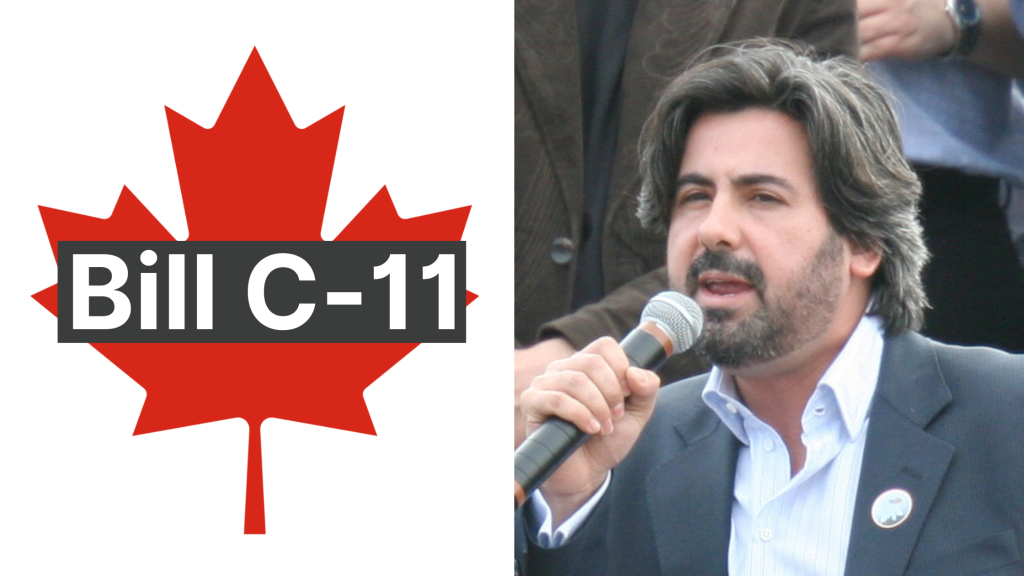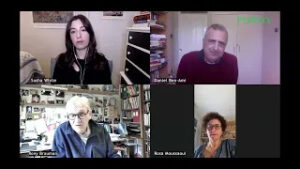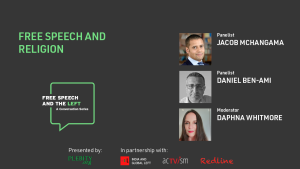
Canadian Heritage Minister Pablo Rodriguez – Wikimedia Commons. Image made in Canva.
After years of contentious debates, Bill C-11, Canada’s Online Streaming Act has become law.
As we’ve written here (Senate Passes Controversial Internet Censorship Bill) and here (Canada’s Plans to Regulate the Internet), this bill poses many dangers for Canadian users and creators alike.
Of the bill’s passing, OpenMedia Campaigns Director Matt Hatfield said,
“Today the Senate backed down and passed a version of Bill C-11 as bad for Canadians as it was a year ago . . . User audiovisual content — the TikToks and podcasts you upload — can now be regulated as broadcasting by the CRTC under C-11. And the CRTC can overrule your feeds and search results to show you content they consider officially “Canadian”. We’re tremendously disappointed. Plainly excluding user content would have been a no-brainer: it would’ve achieved the bill’s core aim, while protecting Canadians from the CRTC’s regulatory control.
But make no mistake: the fight isn’t over yet. While legal protection of our content was the best option, Heritage Minister Rodriguez can still issue a clear policy direction to the CRTC that tells them our user content should not be regulated in practice, and our choices must be respected. That’s where the fight will go next. (emphasis mine)”.
Throughout the entire journey of the bill — from its first introduction to it becoming law — the process was nowhere near democratic. MPs rushed consultations, criticism was ignored (and even labeled as ‘misinformation’), and debate was repeatedly curtailed. And in March 2023, a critical amendment was rejected that would have offered key protections to users.
What’s in the bill?
Some of the main functions of the bill are as follows:
- CRTC Expansion of Powers: The bill will expand Canada’s regulatory agency, the CRTC, the power to regulate what we see online under the guise of ‘promoting Canadian Content (CanCon).’ This may include algorithmic manipulation to regulate what we see, forcing streaming giants to promote CanCon, and imposing financial penalties for companies who do not adhere to the CRTC’s rules.
- Financial Penalties: Companies like YouTube and other streaming platforms will be forced to promote Canadian content or face penalties. Creators may also be at risk of additional penalties by streaming giants so companies can offset the financial costs.
- Diversity Initiatives: There is an amendment to promote Black and Indigenous voices which may have a paradoxical effect of creating a more homogenous digital landscape in which certain voices are promoted at the expense of others on the basis of superficial characteristics, not on quality or popularity of content.
- CanCon Certification Process: If content creators want to be considered to be a CanCon creator, they must undergo a lengthy application process through the CRTC which follows an outdated points-based system that has not been updated in decades.
The purported goal of Bill C-11 is to “promote Canadian Content” and preserve ‘cultural diversity’ but to achieve this goal will require algorithm manipulation, financial strong arming of corporations, increased red tape for Canadian creators, and an overall regulated digital space that seeks to satisfy the CRTC, not the Canadian people.
The CRTC will be able to boost content that is “Canadian enough” and downrank content that is not. If corporations do not adhere to these new rules, they face financial penalties, as noted above. Many companies have come out criticizing the bill, but with little results. YouTube’s head of music, Lyor Cohen said there would be ‘unintended consequences’ of the bill.
Cohen explains:
“If you are pushing stuff that’s not on demand, it breaks the user experience, and I think it would really harm creativity. It will harm young artists and emerging artists. I think it will clip the wings of creativity for that matter and it will clip the wings of emerging artists.”
Google posted an update on its stance against Bill C-11 citing it seeks to “to protect the livelihoods of thousands of digital Canadian creators, and preserve the authentic user experience that Canadians enjoy on YouTube today.”
Spotify has also criticized the bill. Spotify’s chief economist Will Page has said, “C-11 is a blunt instrument that threatens to derail the significant progress that technological innovation has brought to Canadian culture.”
While not in place yet, Canadian creators could face additional penalties under YouTube’s ‘pass-through’ policy. This is just one of many ways creators can be impacted both financially and otherwise. This would mean creators would face punishment for a rule imposed on them by out-of-touch legislators and DEI advocates who seek to downrank voices whom they do not feel represent ‘Canadian culture’ while simultaneously trying to elevate other voices for reasons that are only skin deep.
As I mentioned in my previous article,
“This bill is the first major update to the Broadcasting Act in 31 years. The Broadcasting Act should be updated to reflect the current landscape, but this bill does not do that. It was pushed by the same people who slept through the digital revolution. The government is setting Canadians back decades by applying outdated rules to problems that no longer exist.”
What’s Next?
Canadian Heritage Minister Pablo Rodriguez has said he’s ‘excited’ about the passing of the bill. The next phase is a policy direction consultation in which Rodriguez will set out his priorities to the CRTC. It’s expected he will likely ask the CRTC to update the definition of ‘Canadian content’ (though ideally this would have been finalized before the bill actually passed).
Lobby groups supportive of the bill are eager to give their input. Within minutes of the bill becoming law, the Coalition for the Diversity of Cultural Expressions (CDCE) praised the Canadian Heritage and the legislators involved in passing the bill. Hélène Messier, Co-Chair of the CDCE said, “By regulating digital platforms, the government is finally bringing our broadcasting ecosystem into the modern age.” In the weeks following up to the passing of the bill, Bill Skolnik, Co-Chair of the CDCE said “We are finally at the finish line: we must cross it as quickly as possible!”
It should be noted that the CDCE has received $375,000 in funding from Canadian Heritage–not entirely surprising given the organization’s subsequent support for Heritage Minister Pablo Rodriguez and his minions.
It’s still unclear the extent to how this bill will impact users, creators, and streaming giants in coming years — at this point we can only wait and see.
We will post key updates as we learn about them.



